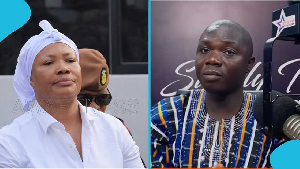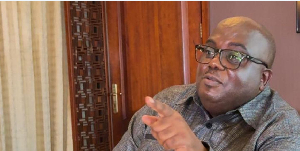Accra (Greater Accra), 19th May 99 ?
The embattled government of Sierra Leone on Tuesday called for global pressure on the Rebel United Front (RUF) and its allies as a way of making them see reason in the latest efforts at ending the war in that country.
The government in Freetown said, while it is committed to current consultations, towards a negotiated settlement with the rebels, it would not accept the option of power sharing as is being proposed by the rebels and some countries.
"We will be going against the Constitution of our land if we bow to the pressure from those making this proposal to share power with the rebels", Mr Julius Spencer, the Information Minister said when he briefed the press at the Fifth African-African American Summit currently underway in Accra.
In attendance was Dr. Sama Bany, Sierra Leonean Foreign Minister, who contributed.
The issue of power sharing, proposed by the rebels and their allies, led by Corporal Foday Sankoh, has been a key element of dispute in their renewed talks with President Ahmad Tejan Kabbah's government in the Togolese capital, Lome.
The key mediators in the Lome talks are Togolese President Gnassingbe Eyadema and current chairman of ECOWAS, and Rev Jesse Jackson, special envoy of US President Bill Clinton to Africa.
President Kabbah and Rev Jackson flew to Lome on Tuesday for consultations.
Mr Spencer said President Kabbah went to Lome to hold consultations with Cpl Sankoh and expressed the hope that the rebel leader and his side will see reason. He reiterated his government's position to grant amnesty to the rebels and their allies to form a political party and contest elections later.
He intimated that amnesty could only be granted to Cpl. Sankoh according to the rule of law, inferring that he will have to go through court proceedings and later be pardoned by President Kabbah.
Mr Spencer also kicked against another proposal to replace the current government in Sierra Leone with a transitional body for four years.
President Kabbah's term of office ends in February 2001.
He said the situation in Sierra Leone is a real test case for democracy in Africa which, if not given the needed attention by all, could spill over to other countries on the continent.
He repeated allegations that the crisis is being fuelled by the governments of Liberia and Burkina Faso with the support of Libya as part of a master plan to cripple countries that have the potential to achieve success in development.
Some international crook businessmen and drug barons are also involved in the conflict which has resulted it the killing of 600,000 and 700,000 people, he said.
"Some girls, who managed to escape after they had been raped by the rebels, are now pregnant, while some have contracted the dreadful AIDS disease. The crisis in my country is not a civil war, as some people want the world to believe. It is a rebel war".
Mr Spencer made reference to the international attention being given to the Kosovo crisis and expressed regrets that while the war in Sierra Leone is much more serious, little attention is being paid to it dismissed the possible bombardment of Freetown as is being done in the former Yugoslavia.
General News of Wednesday, 19 May 1999
Source: null
Sierra Leone government urges pressure on rebel group
Opinions











